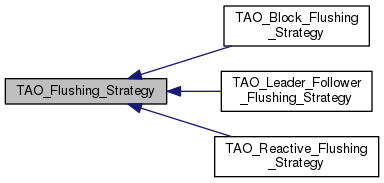|
TAO
2.3.3
|
|
TAO
2.3.3
|
Define the interface for the flushing strategy, i.e. the algorithm that controls how does the ORB flush outgoing data. More...
#include <Flushing_Strategy.h>

Public Types | |
| enum | SCHEDULE_OUTPUT_RETURN { MUST_FLUSH = -2 } |
Public Member Functions | |
| virtual | ~TAO_Flushing_Strategy (void) |
| Destructor. More... | |
| virtual int | schedule_output (TAO_Transport *transport)=0 |
| virtual int | cancel_output (TAO_Transport *transport)=0 |
| Cancel all scheduled output for the transport argument. More... | |
| virtual int | flush_message (TAO_Transport *transport, TAO_Queued_Message *msg, ACE_Time_Value *max_wait_time)=0 |
| virtual int | flush_transport (TAO_Transport *transport, ACE_Time_Value *max_wait_time)=0 |
| Wait until the transport has no messages queued. More... | |
Define the interface for the flushing strategy, i.e. the algorithm that controls how does the ORB flush outgoing data.
Please read the documentation in the TAO_Transport class to find out more about the design of the outgoing data path.
Some applications can block the current thread whenever they are sending out data. In those cases they can obtain better performance by blocking in calls to write() than by participating in the Leader/Followers protocol to shared the ORB Reactor.
This strategy controls how does the ORB schedule and cancel reactive I/O, if there is no reactive I/O the strategy is just a no-op.
|
virtual |
Destructor.
|
pure virtual |
Cancel all scheduled output for the transport argument.
Implemented in TAO_Block_Flushing_Strategy, TAO_Leader_Follower_Flushing_Strategy, and TAO_Reactive_Flushing_Strategy.
|
pure virtual |
Wait until msg is sent out. Potentially other messages are flushed too, for example, because there are ahead in the queue.
Implemented in TAO_Block_Flushing_Strategy, TAO_Leader_Follower_Flushing_Strategy, and TAO_Reactive_Flushing_Strategy.
|
pure virtual |
Wait until the transport has no messages queued.
Implemented in TAO_Block_Flushing_Strategy, TAO_Leader_Follower_Flushing_Strategy, and TAO_Reactive_Flushing_Strategy.
|
pure virtual |
Schedule the transport argument to be flushed If -2 is returned then the caller must call one of the flush_* methods. If -1 is returned then there was an error. If 0 is returned then the flush was scheduled successfully.
Implemented in TAO_Block_Flushing_Strategy, TAO_Leader_Follower_Flushing_Strategy, and TAO_Reactive_Flushing_Strategy.
 1.8.9.1
1.8.9.1